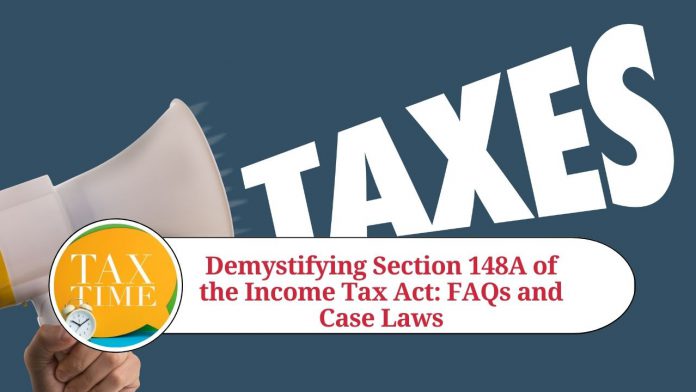Section 148A of the Income Tax Act, 1961 was introduced in 2021 through the Finance Act, 2021. This section empowers the income tax authorities to issue notices for reopening of income tax assessment cases beyond the normal time limit of 4 years, in certain specified cases. The section has already been the subject matter of several legal challenges, resulting in a number of important court decisions. In this blog, we will discuss the key provisions of Section 148A and the case laws related to it.
Introduction to Section 148A
Section 148A of the Income Tax Act, 1961 provides for reopening of assessment in certain cases beyond the normal time limit of 4 years. The section provides that the Assessing Officer (AO) may issue a notice for reopening of an assessment, if he has reason to believe that the income chargeable to tax has escaped assessment due to the failure of the assessee to disclose fully and truly all material facts necessary for the assessment.
Scope of Section 148A
Section 148A applies to cases where an assessment has been completed under section 143 or section 144 of the Income Tax Act, and where the income chargeable to tax has escaped assessment. The section provides that the notice for reopening can be issued within 6 years from the end of the relevant assessment year. However, the notice can only be issued after obtaining prior approval from the Principal Commissioner or Commissioner of Income Tax.
Case Laws related to Section 148A
a. Anand Kumar Agarwal vs Union of India
In this case, the petitioner challenged the constitutional validity of Section 148A of the Income Tax Act. The petitioner contended that the section violates Article 14, 19 and 21 of the Constitution of India. The Delhi High Court dismissed the petition and held that Section 148A is not unconstitutional.
b. Dinesh Kumar Goyal vs Union of India
In this case, the petitioner challenged the validity of the notice issued under Section 148A by the Assessing Officer. The petitioner contended that the notice was issued without proper approval from the Commissioner of Income Tax. The Delhi High Court held that the notice was invalid as it was issued without proper approval.
c. Adfert Technologies Pvt. Ltd. vs Union of India
In this case, the petitioner challenged the validity of Section 148A of the Income Tax Act. The petitioner contended that the section violates the principle of natural justice and is arbitrary. The Delhi High Court dismissed the petition and held that the section is not violative of any principle of natural justice and is not arbitrary.
Conclusion
Section 148A of the Income Tax Act, 1961 has been the subject of several legal challenges since its introduction in 2021. The courts have upheld the constitutional validity of the section, while also holding that the notices issued under the section must be in compliance with the procedural requirements of the law. It is important for taxpayers to be aware of the provisions of Section 148A and to take necessary steps to comply with the law in order to avoid any legal challenges.
Read more useful content:
- section 145 of income tax act
- section 10e of income tax act
- section 9 of the income tax act
- section 94b of income tax act
- section 206aa of income tax act
Frequently Asked Questions (FAQs)
What is the Income Tax Act, 1961?
The Income Tax Act, 1961 is the law governing income tax in India. It outlines the procedures for the assessment and collection of income tax, and sets out the rights and obligations of taxpayers.
What is Section 148A of the Income Tax Act?
Section 148A of the Income Tax Act was introduced in 2021 through the Finance Act, 2021. It empowers the income tax authorities to issue notices for reopening of income tax assessment cases beyond the normal time limit of 4 years, in certain specified cases.
When can the income tax authorities issue a notice under Section 148A?
The income tax authorities can issue a notice under Section 148A if they have reason to believe that the income chargeable to tax has escaped assessment due to the failure of the assessee to disclose fully and truly all material facts necessary for the assessment. The notice can be issued within 6 years from the end of the relevant assessment year.
What is the procedure for issuing a notice under Section 148A?
The Assessing Officer (AO) must obtain prior approval from the Principal Commissioner or Commissioner of Income Tax before issuing a notice under Section 148A. The notice must be issued within the time limit specified under the section, and must be served on the assessee.
Can a notice issued under Section 148A be challenged?
Yes, a notice issued under Section 148A can be challenged if it is not in compliance with the procedural requirements of the law. The assessee can file a writ petition in the High Court or Supreme Court challenging the validity of the notice.
What are the penalties for non-compliance with a notice issued under Section 148A?
If an assessee fails to comply with a notice issued under Section 148A, the Assessing Officer may impose penalties under Section 271(1)(b) of the Income Tax Act. The penalty can range from 100% to 300% of the tax sought to be evaded.




















